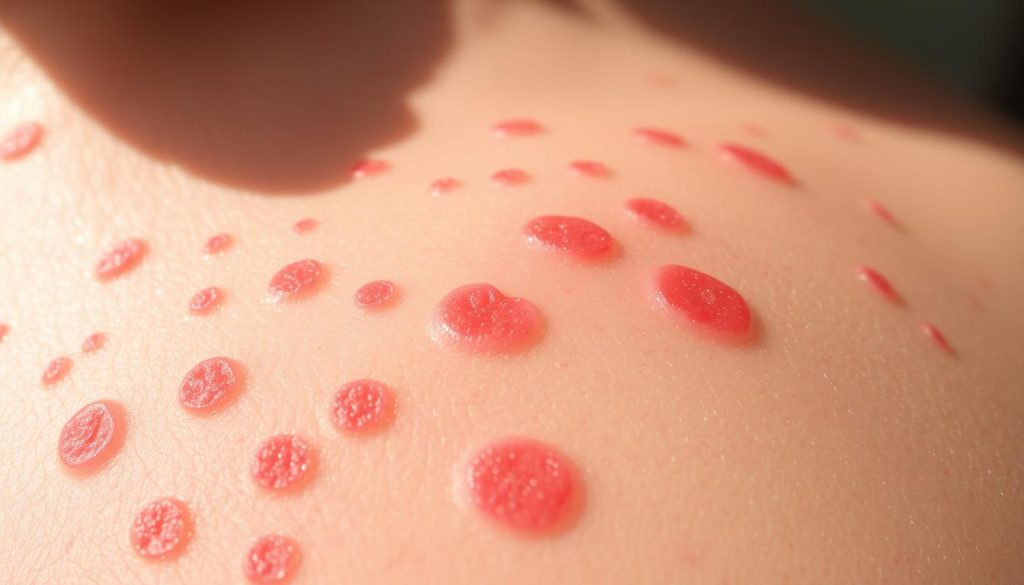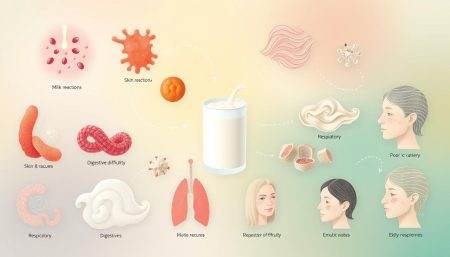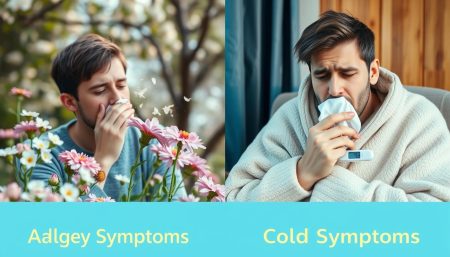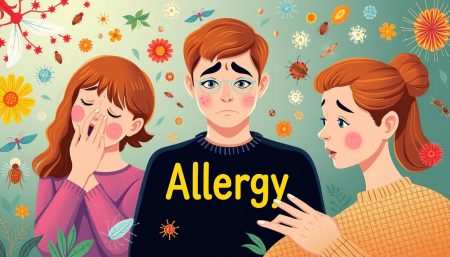Many people find joy in having a cat as a pet. But, some may experience cat allergy symptoms. These symptoms can range from mild to severe and need attention.
Itchy eyes, sneezing, and a runny nose can affect a cat lover’s mood and daily life. These signs are the body’s way of saying it’s allergic to cats.
Spotting these signs early can help manage the allergy. We aim to help by explaining the emotional and physical effects of allergies. If you often rub your eyes after playing with a kitten or have trouble breathing, it’s time to take action.
Key Takeaways
- Early recognition of cat allergy symptoms is vital for managing health and well-being.
- Sneezing, itchy eyes, coughing, wheezing, and a runny nose are common indicators of being allergic to cats.
- Being attuned to these signs can allow for timely interventions and relief measures.
- Understanding the impact of allergies strengthens emotional empathy for those affected.
- Education on symptoms plays a crucial role in the company’s mission to support and inform those impacted by allergies.
Understanding Cat Allergies and Sensitivities
Many people love having cats, but allergies can make it hard. These allergies come from proteins in cat dander, saliva, and urine. Knowing about cat allergies and sensitivities helps manage symptoms better.
What Causes Cat Allergies?
Cat allergies are caused by proteins in cat secretions. These proteins stick to the cat’s skin flakes, or dander. When people breathe in or touch these proteins, their immune system reacts. It sees these proteins as threats, even though they’re harmless.
Identifying Common Allergens: Pet Dander and Beyond
Pet dander is the main allergen, but there are others. Cat saliva and urine also cause allergies. When cats groom, they spread saliva on their fur. This dries and flakes off, carrying allergens.
Urine residues from cats can also cause allergic reactions. Knowing where these allergens come from helps manage them.
The Role of the Immune System in Allergic Reactions
The immune system fights off allergens by attacking them. In cat allergies, it releases chemicals like histamines. This leads to symptoms like stuffy nose, itchy eyes, and breathing problems.
These reactions are the body’s way of protecting itself. But they can be uncomfortable and inconvenient.
Understanding cat allergies, pet dander, and the immune system helps explain why some people react more than others. With the right knowledge, both people and cats can live better lives. Awareness and management are key to a happy home for both.
Recognizing the Early Signs of Cat Allergies
It’s important to spot the early signs of cat allergies to manage reactions well. Knowing these signs and acting fast can make life easier for those affected. Early recognition can improve quality of life and lessen symptoms.
Minor Allergic Reactions to Cats
Minor allergic reactions might seem small but shouldn’t be ignored. They often include a runny nose, eye irritation, or skin rashes. Spotting these signs early is key for good care.
Importance of Early Detection
Allergy detection early on can stop symptoms from getting worse. Early action can ease discomfort and prevent serious problems.

By noticing the early signs of cat allergies, people can talk to doctors about allergies. This step is important for anyone with even minor allergic reactions to cats.
| Early Sign | Description | Immediate Action |
|---|---|---|
| Runny Nose | Continuous nasal discharge, clear or slightly thick. | Use antihistamines, consult a doctor. |
| Eye Irritation | Itchiness and redness around the eyes. | Rinse with water, avoid rubbing. |
| Skin Rash | Mild red patches, possibly itchy. | Apply hypoallergenic lotion, seek medical advice if persistent. |
Knowing these signs and acting right can help manage symptoms. It also helps plan for a future with pets.
Common Symptoms of Cat Allergies
Many people love having cats, but allergies can get in the way. These allergies usually come from pet dander allergy, which includes skin, fur, and saliva proteins. Knowing these symptoms helps manage them better.
A rash is a common sign, showing up as red, itchy patches on the skin. Scratching can make it worse, leading to more irritation or infection. People might also sneeze, have red or itchy eyes, and feel nasal congestion.
Asthma caused by cat allergies is a big worry. Symptoms like wheezing, trouble breathing, and a tight chest can happen, especially in those with asthma. These problems get worse because of dander in the air, even when cats aren’t around.
- Rash: Red, itchy patches that may lead to further irritation
- Respiratory issues: Including wheezing and shortness of breath, especially in asthmatic individuals
- Nasal symptoms: Frequent sneezing and a runny or blocked nose, a direct response to pet dander allergy
Dealing with these symptoms often means taking medicine, changing the environment, and making lifestyle changes. Keeping areas clean, grooming pets regularly, and using air purifiers help a lot.
If symptoms are severe or get worse, seeing a doctor is a good idea. An allergist can give a specific diagnosis and treatment plan. This is crucial for those with serious, ongoing allergic reactions to cats.
Sneezing and Nasal Congestion
Sneezing and nasal congestion are common symptoms of cat allergies. They can make everyday life hard, as they affect breathing and clear thinking. It’s important to find ways to manage these symptoms for those allergic to cats.
Coping with a Runny Nose
A runny nose often comes with nasal congestion. This makes cat allergy symptoms worse. Using tissues and a saline nasal spray can help keep your nose clear.
Home Remedies and Tips for Relief
Home remedies can help with cat allergies without needing medicine. Some simple tips include:
- Hydration: Drinking lots of water can thin mucus, easing nasal congestion.
- Steam Inhalation: Inhaling steam from a hot shower or bowl can soothe your nose and help with congestion.
- Essential Oils: Eucalyptus and peppermint oils can open airways and feel refreshing.
These small changes and remedies can help you feel better and take back control of your reactions to cat allergens.

Eye-Related Allergy Symptoms: Itchy and Watery Eyes
Many people face discomfort from cat allergy symptoms in their eyes. They might have itchy eyes and allergy-induced watery eyes. These symptoms can make daily life hard and affect your quality of life. It’s important to understand and manage these symptoms well.
Itchy eyes from allergies can be very uncomfortable. They might feel red, swollen, and itchy. Rubbing them can make things worse. Allergy-induced watery eyes are the body’s way to get rid of allergens.
- Simple changes at home, like using air purifiers and keeping pets out of the bedroom, can help a lot. Learn more about these changes.
- Rinsing your eyes with saline solution can give quick relief.
- Applying a cool compress to your eyes can help with itching and swelling.
Here’s a table with some environmental changes that can help with cat allergy symptoms:
| Environmental Adjustment | Benefit |
|---|---|
| Use of HEPA filters | Traps allergens and reduces airborne dander |
| Regular washing of bedding | Minimizes allergen accumulation |
| Keeping cats out of the bedroom | Lowers exposure to allergens during sleep |
Managing cat allergy symptoms often involves home changes and medical help. Over-the-counter or prescription meds might be needed for severe cases.
If your symptoms keep bothering you, see a doctor. They can help find ways to manage itchy eyes and allergy-induced watery eyes better.
Cat Allergy Symptoms Manifested on Skin
Allergies often show up on the skin first. For many, skin rashes and hives from allergies are the first signs of a cat allergy. It’s important to understand and manage these symptoms to stay comfortable and healthy.
Dealing with Rashes and Hives
Skin reactions like rashes and hives can be upsetting. Skin rashes from cat allergies are red, itchy, and can appear anywhere. Hives from allergies are raised, itchy welts that can change in size and shape. They can pop up when you’re near cats or when you touch things with cat allergens on them.
To learn more about skin-related allergic reactions, watch how often and how these symptoms show up. This info helps doctors figure out what’s wrong.

Preventative Measures for Skin Reactions
Preventing allergies is better than treating them, especially when it comes to cat allergy prevention. Here are some ways to reduce exposure and lessen allergic reactions:
- Limit direct contact with cats, especially for extended periods.
- Use high-efficiency particulate air (HEPA) filters to reduce airborne dander.
- Regularly wash bedding, curtains, and other fabrics that may harbor allergens.
- Consider using allergy-reducing sprays designed to neutralize pet allergens.
Using these methods can help reduce skin rashes and hives from allergies. This improves your overall quality of life.
Respiratory Responses: Coughing and Wheezing
Many people with cat allergies react to cats by coughing and wheezing. These signs show how the body tries to get rid of allergens in the air.
Understanding these symptoms can help manage allergies. When cat allergens like dander or saliva get into the airways, they cause inflammation. This inflammation makes it hard to breathe and leads to wheezing.
- Coughing: Often a reflex to clear the breathing passages of irritants and mucus.
- Wheezing: Caused by tightened airways or inflammation.
- Breathing difficulties: Can range from mild to severe, affecting daily activities.
The breathing problems can be mild or severe. Severe cases can really affect your life and might need medical help. It’s important to know that breathing issues can get worse fast.
It’s crucial for those with severe breathing problems due to cat allergies to see a doctor. This can help manage symptoms and prevent them from getting worse.
By recognizing these signs early and acting fast, people can live better with cat allergies. Keeping an eye on environmental triggers is important. But, if coughing or wheezing doesn’t go away, it’s best to get medical advice.
Breathing Difficulties and Asthma Attacks
People with sensitivities need to know about asthma from cat allergies. It’s important to understand how cat allergens can cause breathing problems. Without the right care, these problems can turn into serious asthma attacks.
Understanding the Link Between Cat Allergies and Asthma
Asthma from cat allergies happens when someone allergic to cats breathes in allergens. These allergens can cause tightness in the chest, wheezing, and breathing troubles. The body’s reaction can be quick, making a simple exposure a big problem for asthma sufferers.
Managing Asthma Symptoms Exacerbated by Cats
Managing asthma with cat allergies needs a careful plan. It includes preventing and treating asthma attacks. Here are key steps to manage asthma well:
- Maintain clean living environments to minimize allergen presence
- Use air purifiers to capture cat dander and other allergens
- Adhere to prescribed asthma medications, including inhalers and corticosteroids
- Plan regular check-ups with healthcare providers to adjust treatment as necessary

The aim is to cut down on exposure and prevent breathing problems from getting worse.
| Strategy | Description |
|---|---|
| Environmental Control | Implementing air purifiers and maintaining cleanliness to reduce allergen levels. |
| Medication Adherence | Regular use of inhalers and other prescribed medications to prevent flair-ups. |
| Regular Medical Review | Continuous assessment and adjustment of treatment plans with a healthcare provider. |
It’s crucial to reduce asthma attacks from cat allergies. This makes a safer space for those affected. By knowing the triggers and using strong management plans, people can better control their asthma. This leads to a much better life quality.
Severity of Symptoms: Mild to Severe Reactions
When we talk about cat allergies, the severity can vary a lot. It’s important to know if you have mild allergy symptoms or severe allergic reactions. This helps you manage your exposure and treatment better.
Mild symptoms might be sneezing or minor eye irritation. These can usually be handled with over-the-counter meds or small changes in your life. Knowing about these mild reactions is key for those who want to live with pets or in places with pet dander.
But, severe allergic reactions can be very dangerous. They can lead to anaphylactic shock, which is a serious condition that needs quick medical help. These reactions are less common but much more serious, needing fast action to stay safe.
- Monitoring Symptoms: Watching how your body reacts to allergens can help spot patterns or worsening symptoms.
- Medical Consultation: Getting professional advice is key if your symptoms don’t get better or get worse.
- Educating Others: Telling people around you about your allergy can help them react quickly and correctly if you have a severe reaction.
To show the difference in symptoms, here’s a table comparing mild allergy symptoms to severe allergic reactions.
| Mild Symptoms | Severe Symptoms |
|---|---|
| Itchy, watery eyes | Difficulty breathing |
| Runny nose | Swelling of face, lips, or eyes |
| Sneezing | Hives appearing across the body |
| Minor rash | Feeling dizzy or faint |
Everyone’s experience with cat allergens is different. It’s crucial to know where you stand on the allergy severity scale. Whether you face minor annoyances or serious health risks, recognizing and respecting your allergic reactions can greatly improve your health and life quality.
Coping with Cat Allergies: Practical Tips
Many people love having cats, but allergies can make it tough. Finding ways to manage cat allergies and keeping a clean home helps. Here are some tips to help you enjoy your cat without health issues.
Maintaining a Clean Environment
Keeping your home clean is key for allergy sufferers. Regular cleaning, air purifiers, and allergen-resistant bedding help a lot. Here’s how to do it:
- Use high-efficiency particulate air (HEPA) filters to trap pet dander and other allergens.
- Wash bedding weekly in hot water to kill any potential allergens.
- Keep your pets off of furniture, especially beds, to reduce dander accumulation.
- Vacuum frequently using a HEPA-filtered vacuum cleaner.
Keeping your home clean reduces allergens. This helps in managing cat allergies and makes your home healthier.
Considerations for Living with Cats Despite Allergies
Living with cats and allergies means making lifestyle changes. Here are some ideas:
- Create an ‘allergy safe’ zone, preferably the bedroom, where cats are completely restricted.
- Bathe your cat regularly to reduce the amount of dander and allergens.
- Brush your cat frequently to catch loose fur and dander before they spread around your home.
- Consider allergen-reducing sprays and solutions that can be applied to your pets’ fur.
These steps can make life better for those with cat allergies. They help both pets and owners live together more comfortably.

Treatment Options for Cat-Induced Allergies
Finding the right treatment for cat allergies can greatly improve life quality. There are many options, from over-the-counter meds to prescription drugs and allergy shots. It’s important to know when to use each one.
Over-the-Counter Medications and Prescriptions
When cat allergy symptoms show up, many turn to over-the-counter meds first. Antihistamines, decongestants, and nasal sprays can help with sneezing, runny nose, and itchy eyes. But for serious or ongoing issues, prescription meds might be needed. They offer stronger relief under a doctor’s watch.
| Medication Type | Common Brands | Usage Considerations |
|---|---|---|
| Antihistamines | Claritin, Zyrtec | Quick relief from sneezing and itching |
| Decongestants | Sudafed, Afrin | Reduces nasal congestion |
| Nasal Corticosteroids | Flonase, Nasonex | Controls inflammation, longer-term treatment |
| Prescription Allergy Shots | Not applicable | Administered by healthcare providers for chronic cases |
When to Consult an Allergist
If over-the-counter meds don’t work, or if you’re not sure what’s causing your allergy, see an allergist. They can do tests to find out what you’re allergic to. Then, they can create a treatment plan that might include shots or other treatments.
Seeing an allergist is key for those with severe allergies. They can help find ways to manage your symptoms long-term.
It’s important to understand and treat cat allergies to stay comfortable and healthy. Using the right over-the-counter meds and getting help from an allergist when needed can help you live with cat allergies.
Can You Develop Tolerance to Cat Allergies?
Many people wonder if they can get used to cat allergies. This is because they love cats but often react badly to them. It’s a big question for cat lovers and those allergic to them.
Scientists are studying how people can get used to cat allergies. They look at how much exposure, genetics, and the environment play a role. Some studies show that slowly getting used to cat allergens can help the body react less.
The concept of developing immunity requires precise and sustainable exposure to allergens under medical supervision.
But, it’s important to be careful. Not everyone’s body reacts the same way. Without a doctor’s help, trying to get used to cat allergies could make things worse. So, always talk to a doctor before trying to adapt to cat allergies.
Here’s a table that shows the difference between getting used to allergies naturally and through immunotherapy:
| Method | Description | Time Frame | Effectiveness |
|---|---|---|---|
| Natural Exposure | Gradual increase in allergen exposure without medical supervision. | Variable | Less predictable, can vary greatly between individuals. |
| Immunotherapy | Controlled exposure to allergens under professional guidance. | 3-5 years | Highly effective with long-term relief for many patients. |
Learning about allergy adaptation and developing immunity to cat allergies helps both current and future pet owners. It shows how to live with pets even if you’re allergic.
When to Seek Emergency Medical Attention
Knowing when to get emergency help for allergies is key, especially for severe reactions. Spotting severe allergic signs early can be a lifesaver. This is especially true for those who have extreme reactions to allergens.
Recognizing Signs of a Severe Allergic Reaction
Severe allergic reactions, or anaphylaxis, need quick medical help. Here are the signs that mean you should get emergency care for allergies:
- Difficulty breathing or wheezing
- Swelling of the face, lips, or throat
- Severe itching or hives spreading across the body
- Dizziness, fainting, or a rapid drop in blood pressure
- A sense of impending doom or severe anxiety
- Nausea, vomiting, or severe abdominal pain
These symptoms can come on fast and get worse quickly. It’s very important to act fast.
The Importance of an Emergency Action Plan
Having an allergy action plan is vital for those at risk of severe reactions. This plan should include:
- How to spot early signs of a reaction.
- When and how to use prescribed meds, like epinephrine auto-injectors.
- Emergency contact numbers, like a local emergency service and a nearby relative or friend.
An effective allergy action plan helps both the person with allergies and those around them. It ensures a quick and right response in a critical situation. This can be the difference between a safe medical response and a life-threatening situation.
Are Hypoallergenic Cats Real?
Many people with cat allergies still want a feline friend. They look for hypoallergenic cats, hoping for less allergic reactions. But are these cats really safe for those with allergies? Let’s look at the facts and myths about these breeds.
Understanding the Myth of the ‘Allergy-Free’ Cat
No cat breed is completely allergy-free. The main allergen is Fel d 1, found in cat skin and saliva. Some breeds may have less of this protein, making them hypoallergenic. Yet, they can still cause allergic reactions in some people.
Which Cat Breeds Are Best for Allergy Sufferers?
Some cat breeds are better for those with allergies. Here’s a quick list of these breeds:
- Siberian: Known for having lower levels of the Fel d 1 protein.
- Balinese: Often referred to as the ‘long-haired Siamese,’ they surprisingly have lower allergen levels.
- Devon Rex and Cornish Rex: These breeds have shorter hair and less undercoat, which may contribute to lower allergen spread.
- Oriental Shorthair: They require frequent grooming to keep dander at bay.
Choosing these breeds might help reduce allergy symptoms. But, it’s smart to spend time with the cat first. This ensures the allergies are manageable. Keeping a clean home and regular grooming also helps.
In conclusion, while there are no truly hypoallergenic cats, picking breeds with fewer allergens is a good option. It’s about finding a balance to enjoy a cat’s company without too much discomfort.
Conclusion
Starting to manage cat allergies is key for those with pet allergies. This article covered many aspects of allergies, from first signs to treatment options. With effort, people can live comfortably with their cats.
Understanding cat allergies means protecting health and improving life quality. It’s about finding a balance between loving animals and dealing with health issues. Following tips like keeping a clean home and choosing hypoallergenic breeds can help. This way, people can reduce discomfort and keep their bond with pets strong.
In summary, with medical knowledge and caring advice, managing cat allergies is possible. This guide aims to help and support those with allergies. It offers tips for spotting symptoms early and knowing when to seek help. The goal is to help readers enjoy life with pets, feeling confident and healthy.
FAQ
Q: What are the common symptoms of cat allergies?
A: Symptoms include sneezing, itchy eyes, and a runny nose. You might also cough, wheeze, or get skin rashes. For some, cat allergies can even cause asthma attacks or worse breathing problems.
Q: What causes cat allergies?
A: Cat allergies happen when your immune system reacts too much to proteins in cat skin, urine, and saliva. This reaction is often triggered by pet dander, which builds up in different places.
Q: How can I tell if I’m having a minor or severe allergic reaction to cats?
A: Minor reactions might just make your nose run a bit or feel a little itchy. But severe reactions can make you sneeze a lot, wheeze, have trouble breathing, or even lower your blood pressure. How severe it is can really vary.
Q: Can cleaning my home help with cat allergies?
A: Yes, keeping your home clean can really cut down on allergens. Use a vacuum with a HEPA filter, air purifiers, and clean bedding and drapes often. This helps get rid of pet dander.
Q: Are there home remedies that can help alleviate cat allergy symptoms?
A: Yes, things like saline nasal rinses and humidifiers can help ease symptoms. But, they shouldn’t replace what your doctor recommends, especially for serious allergies.
Q: What over-the-counter options are available for treating cat allergy symptoms?
A: You can try antihistamines, decongestants, and nasal sprays over the counter. But, always check with your doctor first to make sure they’re right for you.
Q: When should someone with cat allergies consult an allergist?
A: See an allergist if over-the-counter meds don’t work, if your symptoms are bad, or if you’re thinking about immunotherapy. They can also help figure out the best way to manage your allergies.
Q: Is it true that some cat breeds are better for people with allergies?
A: While no cat is completely allergy-free, some breeds might be better for people with allergies. Siberian and Balinese cats might be a good choice for those with mild to moderate allergies.
Q: Can I develop a tolerance to cat allergies over time?
A: Some people might get used to cat allergens over time, but it’s not a sure thing. Scientists are still studying how to build immunity to specific allergens.
Q: What are the emergency signs of a severe allergic reaction to cats?
A: Look out for trouble breathing, swelling in your face, lips, or throat, a fast heartbeat, dizziness, or fainting. If you see these signs, get help right away.


















